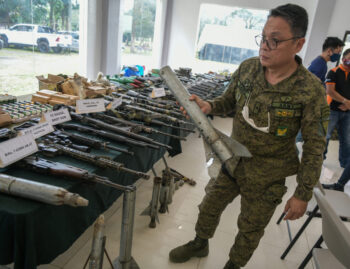GENERAL SANTOS CITY (MindaNews/25 February) — Senator Juan Ponce Enrile, chair of the Impeachment Court (IC) trying Chief Justice Renato C. Corona for culpable violation of the Constitution, betrayal of public trust and graft and corruption, did a Solomonic decision with the admonition “Render unto Caesar what belongs to Caesar and to God what belongs to God” during the hearing on Article 7 of the impeachment complaint last Wednesday and Thursday (February 22 and 23).
On the witness stand was Justice Secretary Leila de Lima testifying why she defied last November 15 the Temporary Restraining Order issued by the Supreme Court. The TRO would have allowed former President Gloria Macapagal-Arroyo to leave the country by restraining the Department of Justice from enforcing its Watch List Order banning her from traveling abroad because of impending criminal cases against her. De Lima stood by the DOJ’s WLO preventing Arroyo from boarding her plane for Singapore.
In her oral testimony, relying mainly on the dissenting opinion of Associate Justice Maria Lourdes Sereno, she related how Corona had the TRO enforced despite the failure of Arroyo to meet one of three conditions. Chief Defense Counsel Serafin Cuevas moved to strike out from the record De Lima’s testimony as mere hearsay – inadmissible according the Rules of Evidence.
In response, Enrile ruled that the IC is trying an impeachment case, not a criminal case. The Rules of Evidence do not strictly apply. He ordered to keep on record De Lima’s testimony in full marked e HH as her testimony; but as to its truth or falsity relevant to the complaint it would be considered as hearsay evidence.
In short, since De Lima has no personal knowledge of the Supreme Court proceedings, her testimony is hearsay. That half satisfies the position of the defense. The other half – keeping her testimony as her testimony – satisfies the prosecution as it can argue for its admission as evidence or have Sereno authenticate her dissenting opinion on record.
Enrile has “rendered” to the defense what “belongs” to it – its position that De Lima’s testimony is hearsay according to the Rules of Evidence. At the same time he has “rendered” to the prosecution what “belongs” to it – the burden of validating truth in hearsay evidence.
The hearing on Article 7, like that on Article 2, has exposed the contradiction in the “rule of law”. While touted as the “rule” to arrive at truth and justice, when convenient it is used to rule out truth. Behind this, the defense is ruling out the truth about Corona.
Delima’s testimony was testimony by authority – an accepted mode of arriving at the truth. This is employed by scholars in their researches – primary, when referring directly to an author’s work; secondary, when referring to an author’s work as quoted by another author. De Lima’s reference was primary.
The President reports to the nation from time to time based on the official reports of government offices and agencies. He has no personal knowledge of those official reports. By the Rules of Evidence, the State of the Nation Address, for instance, is hearsay.
In judicial courts, reports are admitted as documentary evidence if authenticated. This must be the basis of Sen. Miriam Defensor-Santiago’s remark that the prosecution’s case is lost unless Justice Sereno can authenticate her dissenting opinion. This can happen if the prosecution can convince the IC to invite Sereno; if the prosecution can invite Sereno; or, if Sereno voluntarily appears as witness.
But the Supreme Court has resolutions en banc banning the justices or any Court official from testifying in the IC trial and preventing the disclosure of Court records. How can the IC or the prosecution penetrate the tightly walled-in Supreme Court and have Sereno testify or authenticate her dissenting opinion on record?
De Lima’s testimony contains damning truth. But considered as hearsay, it has to hurdle the imposing Rules of Evidence standing on the way; this can be admitted as evidence if Sereno can testify or authenticate her dissenting opinion on record. However, the Court resolutions also stand on the way. The rule of law in the form of Rules of Evidence and Court resolutions is ruling out truth that can convict Corona.
This is the burden of the senators: Enrile has declared the IC is trying an impeachment case, not a criminal case; the Rules of Evidence do not strictly apply. Yet, unless the Supreme Court relaxes its ban on the appearance of justices as witnesses at IC hearings and on the disclosure of its records, Corona is untouchable behind the rule of law.
Should the Supreme Court maintain its ban, will the senators relax their contemplation of the Rules of Evidence and admit De Lima’s testimony as prosecution evidence? Does the IC relish seeing the law ruling out truth? – (Patricio P. Diaz/MindaNews. MindaViews is the opinion section of MindaNews)







